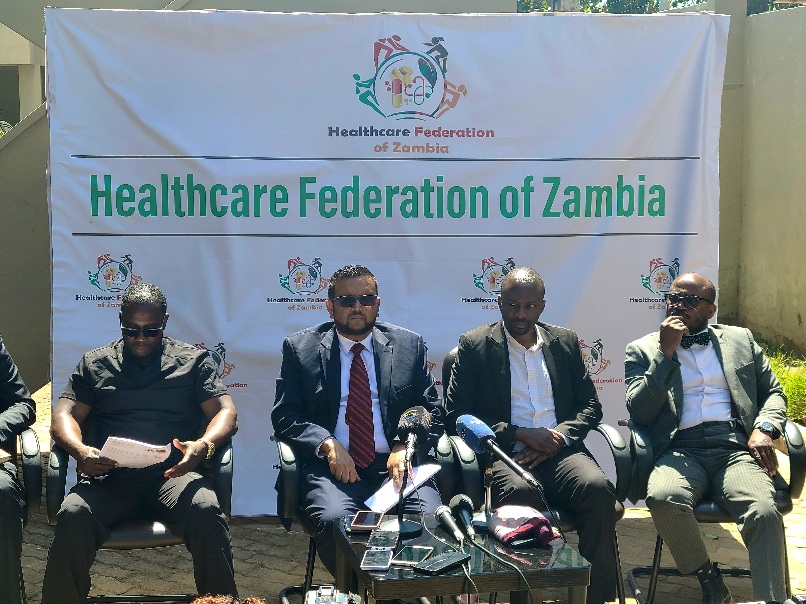Tariff Cuts Hurt Patient Care
 Federation says new limits on drugs and lab tests make adequate treatment harder, demands fair play
Federation says new limits on drugs and lab tests make adequate treatment harder, demands fair playBy Francis Maingaila
Lusaka, Zambia, (18 August 2025) - The Health Care Federation of Zambia (HFZ) has raised concerns over delayed payments and tariff challenges under the National Health Insurance Scheme (NHIS), warning that the situation threatens the survival of private health facilities.
HFZ President Dr. Desai Shaileni said the private sector has played a critical role in delivering healthcare since being accredited under the scheme in 2021, but operational difficulties have made service delivery increasingly unsustainable.
“Since the roll-out of NHIS to private facilities, citizens have benefited immensely, with hundreds of thousands accessing quality healthcare outside public institutions. Our members have diligently served the people of Zambia despite several impediments,” Dr. Shaileni said.
He explained that NHIMA, created in 2018 to manage the scheme, committed to paying healthcare providers within 45 days of billing.
However, many private facilities have not been paid since mid-2024, with NHIMA allegedly prioritizing public hospitals.
“Private providers are caught between fulfilling contractual obligations and the risk of shutting down due to non-payment,” Dr. Shaileni said.
Dr. Shaileni also criticized NHIMA’s tariff structure, introduced in 2021 and unchanged despite rising costs. In January 2025, the authority restructured payments but reduced benefits to patients without consulting the private sector.
Outpatient visits remained capped at K600 but were divided into allocations for drugs, tests, and consultations, while chronic patients were limited to one visit every three months, capped at K1,200.
“These changes have made it extremely difficult to manage patients adequately,” he added.
Private healthcare providers have further called on government to address regulatory disparities, high operational costs, and delayed payments, warning that failure to act risks undermining the country’s healthcare system.
Speaking at a press conference in Lusaka, Dr. Shaileni welcomed government’s recent investment in medical equipment such as CT scans and MRI machines for public hospitals but questioned why the private sector continues to face delays in NHIMA payments.
“Yes, these machines are needed by Zambians. But if government is spending money on public hospitals, why is it failing to pay us for services rendered under NHIMA? We see this as inequality,” he said.
“Private and public facilities are both children of the Ministry of Health. We cannot operate without licensing and approval, just like public hospitals. We need to be treated as equal partners in providing healthcare.”
He said the private sector faces a disproportionate burden in meeting regulatory requirements, noting that while private facilities are penalized immediately for lapses, some public hospitals operate without proper licenses or accreditation for years without consequence.
He also pointed to challenges with the Zambia Revenue Authority (ZRA), where delays in clearing duty-free medical products often lead to high storage costs and operational setbacks.
At the same event, Mutti Clinic Executive Secretary and practitioner Tania Nyirongo urged government to actively involve private stakeholders in policy decisions.
“Government must call us to the table. You cannot apply the same tariffs to private clinics as you do to public hospitals. Government facilities do not pay salaries, rent, or utilities — but we do. When NHIMA delays payments, we struggle to meet these obligations, and yet tax authorities demand full compliance,” Nyirongo said.
She stressed the importance of safeguarding NHIMA, which she said has allowed many ordinary Zambians to access healthcare they could never have afforded before.
“NHIMA must not collapse. If it fails, we all collapse as a nation. Government deserves credit for introducing it, but sustaining it requires fairness and dialogue with all players, not just the public sector.”
Both Dr. Shaileni and Ms. Nyirongo emphasized that HFZ and private healthcare providers are ready to collaborate with government to strengthen the system, but urged swift reforms to ensure equal treatment and sustainability of NHIMA.
HFZ reaffirmed that it will not shield members engaged in malpractice but called on government to recognize the private sector as an equal partner in healthcare delivery.



Comments
Post a Comment